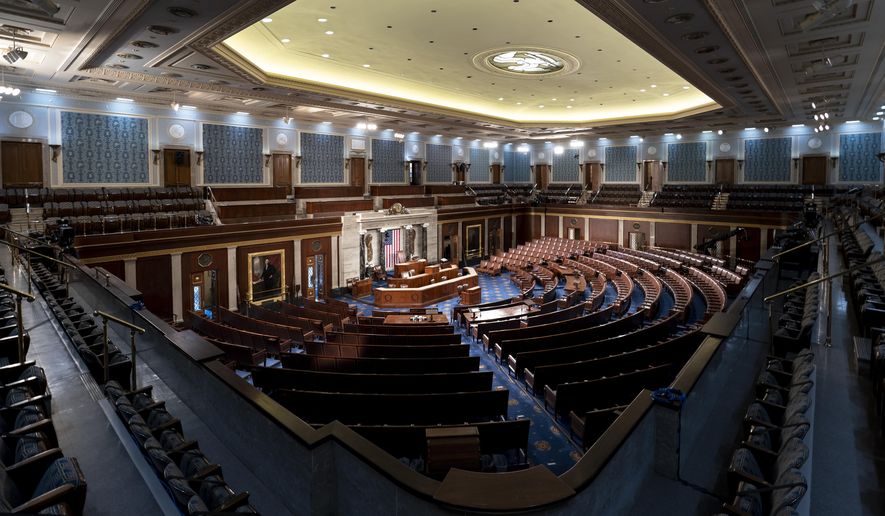House lawmakers debated in a Rules Committee hearing Thursday whether to roll back their system of proxy voting, established two years ago at the outset of the COVID-19 pandemic.
COVID-related measures in the lower chamber have been slowly lifting since President Biden talked about the virus no longer controlling American lives and to “stop looking at COVID as a partisan dividing line.”
The House majority established proxy voting to slow the spread of the virus by keeping members from air travel into Washington and by reducing the number of lawmakers in the chamber during floor votes.
The authorization for proxy voting is set to expire March 30, but could be extended again.
Those seeking to roll back proxy voting, all Republicans, say that while its intention was to protect lawmakers during the pandemic, members on both sides of the aisle are abusing the system to vote remotely for reasons beyond the novel coronavirus.
Lawmakers have voted by proxy while on the campaign trail, on a boat, and in the Congressional parking lot doing a media interview. Other members say that Congress needs to modernize its work rules to be flexible to its members.
Rep. Mike Gallagher, Wisconsin Republican, said the majority of lawmakers who proxy-voted were lying because the document they sign to excuse their absence relates to an “ongoing public health emergency.”
“That’s what you’re signing your name to. There’s no dispute about that. It’s clear in the language. So we know … the overwhelming majority of members proxy voting are lying when they sign this piece of paper,” he said.
Rep. Loretta Sanchez, California Democrat, argued that proxy voting should be codified permanently into the House rules, saying that it was difficult to go vote two weeks after she gave birth to her son by cesarean section.
“I wonder how many of you, after major surgery in which you have stitches, and are told by your doctor that bed rest for two to three weeks is recommended, would drag yourself out of bed to come to work and may end up casting an important vote,” she said.
“But I did it, and I understood the sacrifice. And I’m proud that I showed up for work to do that. But that does not mean that we cannot build in flexibility for those types of situations,” she said.
Rep. Chip Roy, Texas Republican, who never voted by proxy, referenced the late Rep. Ron Wright, Texas Republican, who passed away from cancer last year, and drove across the country to cast his vote in Congress.
He “traveled across the country, in the last weeks of his life, ravages of cancer, because he knew he couldn’t get on the airplane,” he said before mentioning his own family that he often misses when he is away in Washington.
“Those things are all hard. But it’s our job. It’s our obligation, and if you can’t do it, think about not running again. Think about resigning, think about giving it to someone else,” he said. “There are 750,000 people in Texas-21. I ain’t that important.”
Rep. Veronica Escobar, Texas Democrat, suggested that each House member could have an allotment of proxy-day votes, so lawmakers can spend those days as they wish without going beyond the allotment, preventing abuse of the proxy vote.
“If they want to spend those 20 days attending in-district events or saving it for sick days, or saving it for special occasions that they know are coming up that year,” she said. “That should be the member’s prerogative. We should treat members like adults.”
Other Republicans argued that the remote voting process fed into the polarization of House members since many lawmakers often did not see each other throughout the year.
“Our job depends upon interaction. Our job depends upon being able to work together. And I can’t tell you, it countless times, I’ve had conversations with my colleagues over my tenure in Congress, on the floor,” said Rep. Rodney Davis, Illinois Republican. “An idea that I say, take to your leadership, and I’ll take it to my leadership and sometimes those ideas become law, but it takes being able to be on the floor and be together.”
Rep. Jim McGovern, Massachusetts Democrat and Rules Committee chairman, dismissed that notion.
“I have thoughts on why Congress is so polarized, and a lot of it has to do with the aftermath of Jan. 6, among other things,” he said. “I don’t think that that’s the reason.”
The House Democratic majority voted to allow for proxy voting in May 2020 which allowed for members of Congress who expected to be absent from a vote to give written permission to another member to cast a vote on their behalf.
House Republicans were initially against the measure, and House Minority Leader Kevin McCarthy cautioned the GOP would prohibit it if they take control of the chamber next year. He signed on to a lawsuit with around 160 GOP lawmakers questioning its constitutionality.
However, it did not take long for over 150 members of the conference to pull themselves from that lawsuit, which later was stopped at the Supreme Court in January.
Many of those Republicans began voting by proxy themselves by February 2021 during the Conservative Political Action Conference last year.
Republicans who attended the event and voted by proxy instead of in-person told reporters that although the GOP believed the measure is unconstitutional, they are merely following the rules passed by the House.
• Kerry Picket can be reached at kpicket@washingtontimes.com.




Please read our comment policy before commenting.